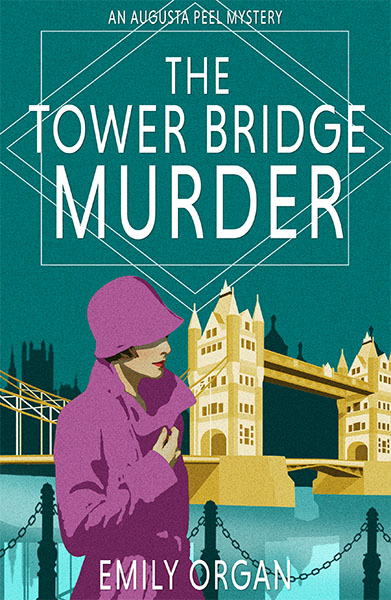A baffling murder and a missing detective.
When the body of a young woman is found on Tower Bridge, former spy Augusta Peel expects Scotland Yard to call on her for help.
But no call comes.
Meanwhile, Augusta is preoccupied with the success of her Bloomsbury bookshop. It’s doing so well that a rival establishment is losing customers. When the rival shop seeks revenge, Augusta must fight to protect her livelihood.
But as the Tower Bridge murder case stalls, Augusta feels sure her sleuthing skills can help. The trouble is, no one’s seen her friend Detective Inspector Fisher for some time. And it’s not long before Augusta discovers he’s completely disappeared…
Available as ebook and paperback.
Book 1: Death in Soho
Book 2: Murder in the Air
Book 3: The Bloomsbury Murder
Book 4: The Tower Bridge Murder
Book 5: Death in Westminster
Read an excerpt from The Tower Bridge Murder ‘It’s definitely colder out there today,’ said Augusta Peel, turning the sign on her Bloomsbury shop door to “open”. ‘I hope the weather doesn’t keep the customers away.’ ‘Hopefully it won’t,’ said her assistant, Fred. He was a dark-skinned young man who wore spectacles and a tweed suit. ‘With a bit of luck, they’ll come in here to keep warm.’ ‘Let’s hope so.’ Fortunately, the bookshop was heated by an efficient stove and, with walls of second-hand books and chairs to read them in, the place felt cosy. Less cosy was Augusta’s draughty workshop at the back of the shop. It was an improvement on the basement she had previously worked in, but she had to wear a lot of layers while in there repairing books. ‘The Tower Bridge mystery,’ said Fred, who was reading a newspaper at the counter. ‘The what?’ ‘Haven’t you read about it yet?’ ‘Not yet. What happened?’ She walked over to peer at the story over his shoulder. ‘A bloodstained bag was found on Tower Bridge last night at about eight o’clock.’ ‘Bloodstained?’ ‘Not nice, is it? There was nothing valuable inside it but a library card was found which was in the name of Celia Hawkins.’ ‘So something’s happened to Celia Hawkins?’ ‘It seems so. The police have issued a description of her. She’s twenty-four with brown eyes and fair hair and is five feet and four inches tall. She works in a clothes store in Battersea.’ ‘I hope she’s alright. Hopefully, they’ll find her soon enough.’ ‘I hope so, too. It sounds like someone robbed her, took the valuables and discarded the bag. But the fact it was bloodstained doesn’t sound good. And why would she have gone missing?’ ‘I can see why it’s being described as a mystery. Are there any more details?’ ‘No, that’s it. There was presumably little time to include more as it must have been close to the deadline for printing last night.’ Augusta wondered what Detective Inspector Philip Fisher made of it. She hadn’t seen him since they had worked together on the Bloomsbury murders the previous autumn. Perhaps this new mystery would prompt him to call on her. She opened the bag of bird seed she kept behind the counter and fed some to Sparky, the canary who perched in his cage on the counter. Sparky belonged to her friend Lady Hereford, but Augusta had been looking after him for the past few months. Her caring duties had begun when Lady Hereford was being treated in hospital and, although she was now living at the nearby Russell Hotel, she felt Sparky was happier with Augusta. He seemed to enjoy watching the customers in the shop and, if they were lucky, he’d treat them to a little song. ‘I suppose I’d better get on with repairing that copy of Howard’s End,’ said Augusta, picking up her fingerless gloves. ‘Shall I make you a cup of tea to warm you up in there?’ ‘That would be lovely. Thank you, Fred.’ Howard’s End had been poorly treated by someone in the past. The spine was broken, coffee had been spilt over the cover and countless pages had their corners turned down. Sometimes it was difficult to decide whether to repair a book or dispose of it. But this copy was a first edition from 1910, so Augusta wanted to do the best she could with it. She tucked her auburn hair behind her ears and set to work on cleaning the cover. She thought about Celia Hawkins as she worked. If the incident had been a straightforward robbery, then why was Celia missing? And the weather the previous evening had been atrocious – pouring rain and a strong wind. There couldn’t have been many people on Tower Bridge at that time. Fred appeared in the doorway with her cup of tea. ‘Mr Fairburn is here to see you,’ he said, wrinkling his nose with distaste. ‘Mr Fairburn from Webster’s bookshop around the corner?’ ‘Yes.’ ‘The bookshop you used to work in, but he dismissed you when he took it over?’ ‘Yes.’ ‘Did he say what he wants?’ ‘No.’ ‘Interesting.’ Augusta took the cup from him and enjoyed the warmth against her gloved palms. ‘I suppose I’d better see him then.’ Mr Fairburn was a bald man with a thick moustache and spectacles. He looked about fifty – ten years older than Augusta. He wore a smart pinstriped suit and had the appearance of a bank manager rather than a bookseller. ‘Mrs Peel, I presume?’ ‘Yes. Mr Fairburn, I believe?’ ‘That’s correct. I didn’t realise Fred now works in your shop.’ ‘Did you not? He’s been working here for about two months now.’ ‘You do realise he used to work in my shop?’ ‘Yes. And he gave me your name as a reference. I never followed up on it, I could tell he would be good at his job.’ She gave Fred a smile. ‘He told me that when you took over from Mr Webster, you brought along your own staff, and he was no longer required.’ ‘A regrettable decision, but I had to maintain my loyalty to my existing staff. It’s a little perturbing to discover a former employee is now working for a competitor close by.’ ‘I think Fred made a sensible choice. He enjoyed working in Webster’s and when that job came to an end, he then chose another bookshop close by. Anyone in his position would have done the same. May I ask what you wish to speak to me about, Mr Fairburn?’ ‘Before you occupied these premises, Mrs Peel, this shop was a magic shop.’ ‘That’s right. Run by Mr H W Matravers. He had to retire because of ill health and went to live with his daughter and her husband.’ ‘I believe so. This place wasn’t a bookshop then.’ ‘You’re right, it wasn’t.’ Augusta sipped her tea. She was already growing tired of Mr Fairburn. He had a pedantic manner about him and she didn’t like the way he kept sniffing and darting his eyes around. ‘When this was a magic shop, everything was going swimmingly,’ he said. ‘I’m pleased to hear it.’ ‘Now that it’s a bookshop, however, business is not going quite so well.’ ‘Is it not?’ ‘To save your time this morning, Mrs Peel, I’ll put this in the bluntest of terms. You’re stealing customers from me.’ ‘Am I? I’m sorry to hear it. It’s not something I set out to do.’ ‘What you set out to do is irrelevant. The fact is, you’re having a detrimental effect on my business. There are simply not enough customers in this locality for two bookshops to coexist in such close proximity to each other. Webster’s has enjoyed its location here for over forty years. Your shop has been here for how long? Two, three months? It stands to reason that the most recently established business should be the one which moves elsewhere.’ Augusta choked on a mouthful of tea. ‘You’re asking me to move my shop, Mr Fairburn?’ ‘In simple terms, yes.’ ‘What a preposterous suggestion!’ ‘Not really. Put yourself in my shoes, Mrs Peel.’ She glanced down at them and noticed they were very shiny. ‘Imagine you’ve invested a lot of time and money in a long-established bookshop, then discover you’re losing customers to a tawdry new establishment which has just opened its doors around the corner. And a shop which has a budgerigar in it too! That can’t be hygienic.’ ‘He’s a canary, and he’s more hygienic than most people I know. If I were in your shoes, Mr Fairburn, then I would ask myself why I was losing customers to a new business. I might wonder if the new establishment had a better offering than my own.’ ‘I find that an impertinent response.’ ‘And I call it common sense. If you’re losing customers, then you’re probably not giving them what they want. At no point have I ever set out to steal business from you. I’m merely selling the books which I repair. This seems to be popular with my customers because they like the character of an old book, and they can buy it for a cheaper price than a new one.’ ‘And there lies the problem! You’re deliberately undercutting my prices. You’re luring my customers away!’ ‘Perhaps you could also sell second-hand books, Mr Fairburn?’ ‘I have no room on my shelves to do so, and nor do I wish to.’ ‘I suspect we attract different types of customers,’ said Augusta. ‘There’s the type who likes a nice new book and will pay a good price for it. I would say that’s the sort of customer who would visit your shop. There’s another type of customer who likes second-hand books and doesn’t have as much money to spend. I suspect they also like canaries and friendly shop assistants like Fred. Those are the people who come to my bookshop, Mr Fairburn. I can’t imagine many of them liking yours.’ Mr Fairburn’s moustache bristled. ‘I can see I’m not getting through to you, Mrs Peel. I have to get back to my shop now, but this matter is far from resolved. You’re clearly a stubborn individual with very fixed ideas. I hope I won’t have to engage my lawyers on this.’ Augusta couldn’t resist a laugh. ‘Lawyers?’ ‘You wait and see, Mrs Peel.’ He pointed a finger at her. ‘Just you wait and see.’

